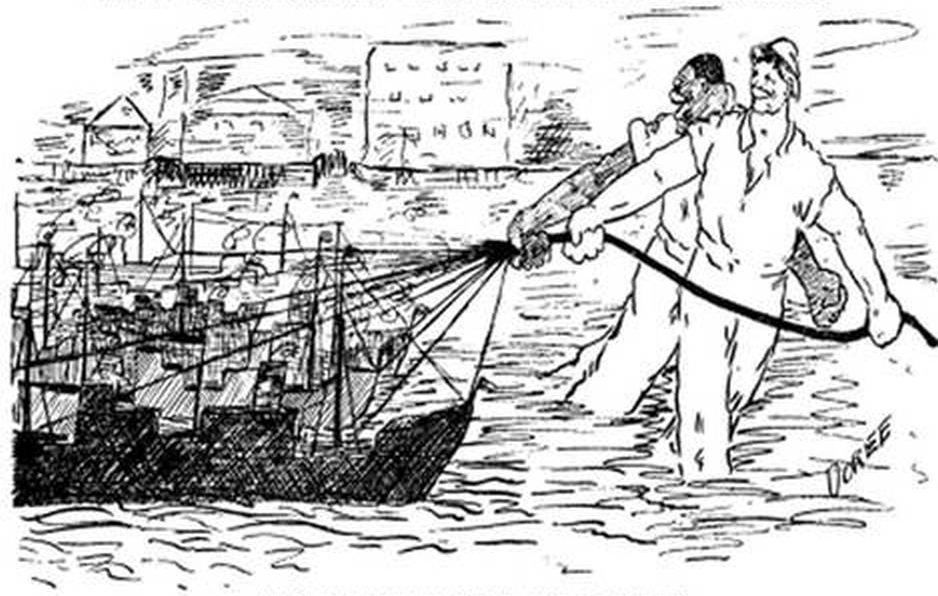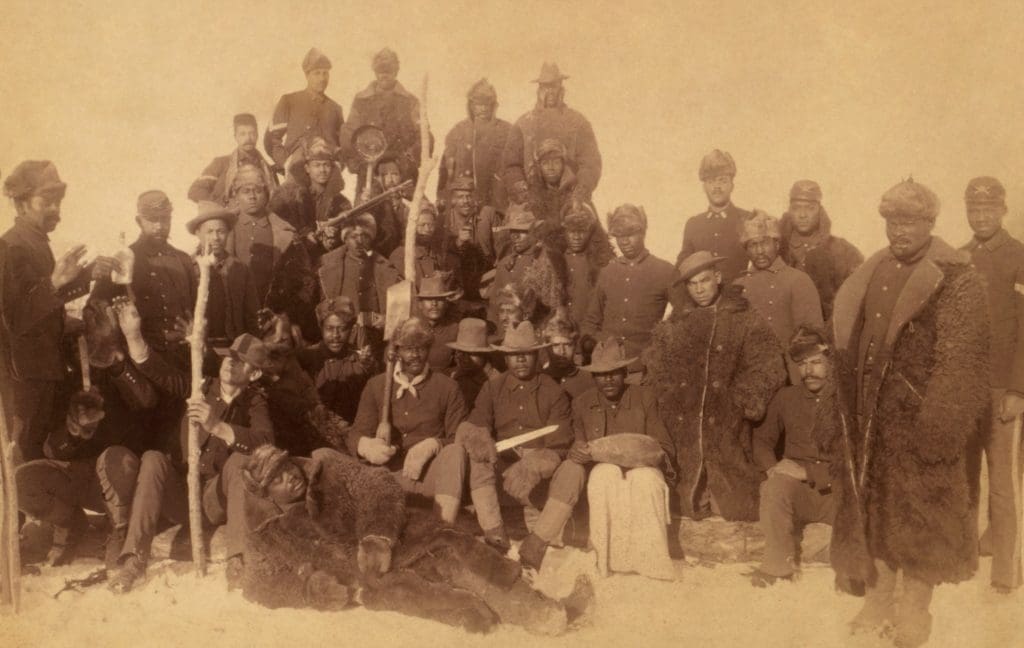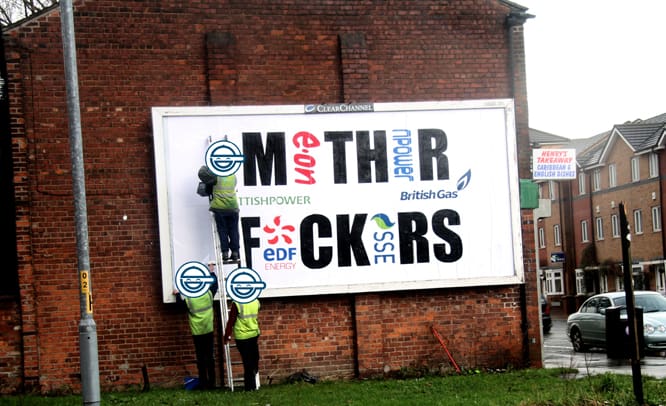Transcribed from the 16 February 2019 episode of This is Hell! Radio (Chicago) and printed with permission. Edited for space and readability. Listen to the whole interview:
The single greatest power of workers was and remains (as the Wobblies said) putting your hands in your pockets—not working. Through strategically stopping work at particular times or places, dockworkers could lend their power to other causes, whether economic or political or social.
Chuck Mertz: Workers at the chokepoints of global capital have flexed their power and had huge impacts on racial equality and other social movements, while showing how to survive in a world of automation. Here to tell us the powerful story of militant radical leftist dockworkers and their victories, historian Peter Cole is author of Dockworker Power: Race and Activism in Durban and the San Francisco Bay Area. Peter is also the author of 2013’s Wobblies On the Waterfront: Interracial Unionism in Progressive-Era Philadelphia. He’s a professor of history at Western Illinois University and a research associate in the Society, Work, and Development Institute at the University Witwatersrand, South Africa.
Welcome to This is Hell!, Peter.
Peter Cole: Thank you, I’m happy to be here.
CM: You begin by quoting Louis Goldblatt, who was the International Longshore and Warehouse Union [ILWU] international secretary-treasurer for thirty-four years, saying in an interview, “The shipping industry has a feature that should never be underestimated. The economic power of the longshoremen is fantastic compared to most workers, the amount of economic leverage they have.”
Why are dockworkers in a position to have more leverage than other workers?
PC: The basics are in phrases that many of us have heard a gazillion times. “The ship must sail on time,” and “Time is money.” In transportation, the industry—which we can call logistics, supply chain management, shipping, etcetera—essentially is all about moving these goods from A to B as quickly as possible, because there are costs involved with time. Workers—and employers, for that matter—understand this basic fact. This fact existed five hundred years ago and it still exists the very second that I’m speaking to you.
CM: If dockworkers have fantastic economic power relative to their colleagues in other unions, how important does that make what the dockworkers do when it comes to organizing—how the ILWU operates and what it stands for, both with their workers and politically, to the overall labor movement? What impact have they had on the overall labor movement?
PC: That’s an important question. If we’re thinking about how to grow it, how to strengthen it, how to build it, that’s key. Could their power be lent to others? Personally, I happen to be in a labor union, the American Federation of Teachers. I’m happy to make more money than without being in a union, but a lot of my work focuses on how people, when they organize collectively, are able to give support to other people who might need help—and that in particular, ordinary people have power especially in their workplaces.
Dockworkers—and I should expand it out to other workers in the transportation industry, although dockworkers matter greatly—can, for instance, refuse to cross a picket line. They can refuse to do something that might potentially hurt another worker. That might be in their same city, or it might even be in another country. The single greatest power of workers was and remains (as the Wobblies said) putting your hands in your pockets—not working. Through strategically stopping work at particular times or places, they could potentially lend their power to other causes, whether they are economic or political or social.
I don’t have a problem with people making more money. I’d rather I make more money than my boss. But more broadly than the material self interest is the question of what else we might use our power on behalf of, not just immediate self gain but instead collectively, in our communities—or even our world.
CM: You write, “As any other human beings would, they’ve used their leverage to improve their own lot.” But you also point out that “they’ve deployed their power on behalf of a vast array of other social movements, particularly to advance racial equality and freedom in their own union’s cities and nations as well as beyond their shores.”
And you point out that this was, at the beginning, a majority-white union. So why embrace racial equality? Why—so long ago—was there a majority-white union embracing racial equality?
PC: In the 1930s, when the west coast US dockworkers union was born, called the ILWU, they wanted to help themselves. They were brutally oppressed by their employers. Dockworkers’ earnings were awful, their conditions of work were dangerous; they were exploited and played off of each other to the benefit of the bosses and to the detriment of themselves, both in terms of the money they made as well as their lives.
However, many dockworkers in the San Francisco port—as well as other ports on the US’s west coast in the mid-thirties, when this big strike happened in 1934, the union born after it—were not only aware of their potential collective power, and not only aware of their oppression, they were also aware that they weren’t alone. They had a politics to them, and many of the leaders (and ordinary rank-and-file members) were politically on the left. You could call some of them communists, you could call some of them socialists; some of them were members of the IWW, the Industrial Workers of the World.
A variety of different traditions on the left were suspicious of capitalism, and one of the reasons was they understood that employers—time and again and still to this day—play workers off each other based on race, ethnicity, nationality, etcetera. In other words, pragmatically speaking, we’re stronger together if we’re antiracist.
Even so, however logical that is, time and again workers have not followed that logic. It’s not just about pragmatism, it’s also about ideology. That’s where the left politics particularly come in: they were committed to being antiracist even though their ranks were at that time largely white—although I would say diverse among different European ethnic groups. But nevertheless, very few African-Americans.
Workers in the shipping industry get that they are part of something global. It’s not like they have to read books about this. Their lives tell them this. They move around the world. Or, if you work in a port, you are interacting with people who have just arrived from other countries, delivering cargoes from other countries. They are talking to each other.
They brought their best politics into their union, and over time, as more blacks were hired, sometimes with the encouragement of the union itself (which later on recruited), they put into practice their ideology, not only to treat people equally but to actively seek out African-American workers, which is sort of amazing for the time. It’s not just about being stronger if we’re willing to look beyond a fellow worker’s race—it’s that they actively tried to do so, and that’s because of their leftist political orientation.
Not all members of the union were leftwing, but many of the members were, as well as its most well-known leaders. You mentioned a guy named Lou Goldblatt, but far better known was the president, a guy named Harry Bridges, an Australian immigrant who had moved to the US in the early 1920s and was already on the left but became more leftwing over time. It’s their politics that explain their activism to fight against racism in their workplaces, in the Bay Area more broadly, and then later on countrywide, when they gave support to the civil rights movement as it came to be known.
CM: It really makes sense that they would want, for pragmatic reasons, to build diversity into the group, and in that way not be broken up by the bosses through any kind of racial divide-and-conquer strategy. But as you’re pointing out, they expanded this to other social movements. How was this support for social movements received by union members? Have there been union members upset because the union was supporting social movements that were not necessarily universally accepted by the membership? I can’t imagine an entire union endorsing, for instance, civil rights.
PC: Of course you’re correct. There’s always a diversity of opinion. We all think differently. So too in this union, which is generally considered a leftwing union. But that does distort the reality that there were always some people who didn’t necessarily agree; within the dockworkers union there were some relatively conservative members. However, first and foremost they liked the union because the union delivered the goods. They were making more money. Their workplaces were safer. They worked fewer hours. The system was less exploitative to them, especially the hiring process—which the union was able to take control of through a successful strike in the thirties.
Even though a significant minority of the membership was conservative—and even that term is relative—they benefited from the union, and they generally supported their leadership too. They might follow along with the leaders, like Harry Bridges, because although they don’t like when Harry talks about civil rights, they actually are very happy that they’re making way more money than they used to and they have a much better work life.
In addition to that, a majority of the members were in fact supportive, and the union was far from perfect but was generally democratic. While all unions in theory are democratic, many unions in practice are not. But this union, which when it was created was created by radicals who were rebelling against the corrupt, undemocratic union that was based in New York City in the same industry—they established a series of democratic principles in their union. For instance, in local 10, which was in the San Francisco Bay area, elected leaders could only serve two terms, two years, before they would have to go back into the ranks. So there weren’t permanent leaders like, for instance, Jimmy Hoffa, who notoriously couldn’t be voted out in the Teamsters. He had made it impossible.
But the ILWU was democratic, and because of that, those who are not in the majority might not be happy about this issue, but can accept that the majority of members are supporting it and there is a basic respect for democracy internal to the union structures. That’s very real. Maybe I don’t agree with my leader on every issue, but the majority do, and I do benefit from the union in very pragmatic ways, like I’m making more money.
So even though not every member of local 10 or the ILWU was actively antiracist—in fact, in any movement or any society it’s only a minority of people who are activists—essentially those who didn’t necessarily agree would go along with it. They were benefiting from unionism and they had some respect for the process..
CM: You write of the South African port in Durban that its “all black dockworkers did not have the right to organize a union, nor did they even imagine an integrated workforce, unlike their San Francisco colleagues. From the 1940s into the early 1970s, however, through their considerable efforts, especially ‘downing tools’ (which is South African and British slang for work stoppages), they proved among the most important forces in Durban that fought Apartheid.”
So it’s not only in San Francisco. Does every major port around the world have leftist, militant, radical dockworkers?
PC: Probably the answer is yes, but the question is how many. I do appreciate you bringing up the Durban side. In Durban, for black workers who were fighting against Apartheid—which was the Afrikaans word for a system of segregation that made American segregation look relatively tame; Apartheid was far worse to the black majority in South Africa—they were of course advocating on behalf of themselves when they were fighting against racists.
In Durban, where the workforce was all black Africans, from different ethnic groups in South Africa—I wouldn’t necessarily always call them leftists. Again, some are. They are clearly repeatedly striking. Sometimes their strikes are for things like wages, although given the black poverty that was pervasive, it’s not surprising at all that they don’t want to be poor. But they increasingly coordinated their work stoppages with other organizations in South Africa that were also fighting against Apartheid, and also appreciated that black workers have more power than blacks in other parts of society—hence “downing tools.”
Sailors and dockworkers—and also other transport workers, like you noted—are very cosmopolitan. That term is often assigned to middle- or upper class people who are global travelers, because they have the wealth and ability to do that, but the truth is that many working class people are also cosmopolitan, especially those who work in this industry
However, there were in fact some Durban dockworkers who are clearly leftwing, who were part of organizations that should be seen as left. The unions that they later joined were part of the anti-Apartheid movement and overtly socialistic; both the ILWU in the west coast of America and the South African dockworkers in Durban adopted as their motto the motto of the IWW, “An Injury to One is an Injury to All.” Again, although they were very much anti-Apartheid because they support racial equality, they were not only interested in that. They were also interested in economic equality, which is another way to think about socialism.
CM: In order to have an effectively organized workforce, does that workforce have to be global, or at least global in its viewpoint? Does a workforce organize globally because the industry does?
PC: That’s an important question, past and present. Historically, it was sailors and dockworkers in the late 1800s in London—which at that time was still the greatest, busiest port in the world—that created an international transport workers federation that was first open to maritime workers and now includes things like truck drivers, railroad workers, etcetera. As you said, shipping is global. I say shipping was the first industry of global capitalism. If you think about it, when capitalism was born in the fifteenth and sixteenth centuries, it rises with European colonialism or imperialism, and it’s all about extracting resources, labor, and wealth from other parts of the world and bringing them back to Europe. So shipping is primary. With the enslavement of Africans to grow sugar in the Caribbean for the profits to go back to England, France, and other places, shipping is central.
Workers in the industry themselves get that. It’s not like they have to read books about this. Their lives tell them this. They move around the world. Or, if you work in a port, you are interacting with people who have just arrived from other countries, delivering cargoes from other countries. They are talking to each other. So the industry is inherently multinational, global, and multicultural.
The issue of whether the labor movement has to be global—that’s a big, big question. The basic issue is that workers are humans, and humans nowadays are members of certain nations and have citizenship rights, and most of our rights are granted by countries’ governments, not by a world government. Corporations, of course, can flee, can travel around the world; humans can’t. So although the unions, including in shipping, might need to be global, the reality is that every country has a different set of labor laws. This is one of many ways in which corporations basically control the system, because the system was designed for them and by them, as opposed to us.
Everyone knows at some level that we need multi- or international unions. But in practice, how does that operate? There is yet to be an answer. Even in shipping, ships are registered in different countries, and that technically determines which labor laws apply. That’s why shipping corporations put all their ships in certain countries that have more relaxed or non-powerful labor laws, like Panama, or Liberia. Everyone knows this—all the corporations in America are based in Delaware because it has easy corporate law. That’s the reality that we live in.
CM: You quote twentieth century historian Frederick Cooper writing, “Ports are not simply specific instances of a general phenomenon. They are connected to one another. Whatever the spatial fixity of a port, the reason for its existence is its links with other specific locations, quite often in other nations and other parts of the world.”
When I read that, being in Chicago and having studied Chicago history, I couldn’t help but think of the Pullman porters and how they, too, were involved in transportation, linking locations like Memphis to Chicago, as well as involved in the distribution of black newspapers and their role in the development of the civil rights movement here in the United States.
Does labor movement power expand when labor has a deeper connection with the greater world? If anything, does dockworker organizing reveal the power of making a labor movement become international, if not global—that globalization in labor and social movements works?
PC: Like you said, it’s not limited to shipping or maritime transportation. It also is applicable to other forms of transport. A couple days ago I met a guy in Michigan who was a truck driver, and he regularly drove from Michigan down to Illinois. He has a life based on his work that opened his eyes to what was happening in other places.
Pullman porters, who were predominantly African-American men historically, didn’t necessarily get paid great but they were deeply respected in many black communities across the country because they traveled, and that was seen as valuable in particular because it meant they had access to knowledge and information that most other people didn’t. They were conduits of information. They delivered newspapers like the Chicago Defender.
This goes back to sailors in the 1700s and 1800s—how did black people in America learn about the successful Haitian uprising that was the first and only successful slave revolution in the history of the western hemisphere? Black sailors were delivering this information to American slaves. A famous black man named Denmark Vesey, a slave in Charleston, South Carolina in 1822, who had been a sailor and inspired by Haiti, tried to plot an overthrow in Charleston. He got betrayed and the plot failed—and in the aftermath, the city of Charleston banned black sailors from getting off the ships that they work aboard, because the power elite understood that black sailors were disruptors. They brought information with them that would be potentially inspirational to blacks on the mainland of North America.
Sailors and dockworkers—and also other transport workers, like you noted—are very cosmopolitan. That term is often assigned to middle- or upper class people who are global travelers, because they have the wealth and ability to do that, but the truth is that many working class people are also cosmopolitan, especially those who work in this industry. Or they just live in port cities where, even if you don’t work in the industry, you’re exposed to people and ideas that you might not otherwise see.
You don’t have to work as a Pullman porter in Chicago in the early twentieth century to be exposed to some of these ideas. Chicago is a city of transport—the railroads are key, but it’s because of its relationship to the Great Lakes and the Illinois river and the Mississippi river through a canal that Chicago became Chicago, and railroads just expanded that more.
Transportation generally is an exciting industry to think about because it’s so central as a lifeline, not just for economic reasons. That’s why it’s an industry to think about. Dockworkers are powerful because they’re a central node of this global (and also domestic) system of the movement of goods and information.
Containerization, the movement of goods in all these metal boxes, drastically expanded and changed global trade. It takes a lot of space, so in most old port cities, the older areas literally can’t hold these goods. Many ports have physically moved to the outskirts in order to have the space. That’s why in so many classic or historic port cities, these old neighborhoods, which are always by the water, are now being “redeveloped” or gentrified into housing and other commercial purposes. They are no longer ports.
CM: You quote the philosophers and filmmakers Allan Sekula and Noel Burch “rightly declaring in their 2012 film Forgotten Space that ‘the sea remains the crucial space of globalization. Nowhere else is the disorientation, violence, and alienation of contemporary capitalism more manifest. But this truth is not self-evident and must be approached as a puzzle, a mystery, a problem to be solved.’”
You mention how port workers, as part of that entire industry of shipping, are often hidden. So how are disorientation, violence, and alienation of contemporary capitalism manifest at sea, and how does that disorientation, violence, and alienation hide dock workers?
PC: Other workers, too. A recent book was published with the title Ninety Percent of Everything, because even today ninety percent of the goods we consume have been moved for at least part of their journey from production to consumption by ship. Not just by transportation, but by ship. So even today, we—in America but not just in America—are entirely dependent upon shipping as an industry.
Sekula and Burch’s documentary film, which is really amazing if somewhat obscure, is wonderful because they’re trying to explore this invisible part of global capitalism—it’s not just because it’s somewhere else. Think about how Amazon is going to deliver things by drone now. You push your button, and a day later some drone delivers some goods to your door. This is amazing on some level, but it obscures that it’s not coming just by drone. You’ve missed all the other links in the chain of how you got whatever it is that you happen to want at that moment.
Dockworkers and sailors are the key. How many of us know these sorts of people, or even about these people? How many of us even see it? It depends on the place. Containerization, the movement of goods in all these metal boxes, drastically expanded and changed global trade. It takes a lot of space, so in most old port cities, the older areas literally can’t hold these goods. Many ports have physically moved to the outskirts in order to have the space. That’s why in so many classic or historic port cities, these old neighborhoods, which are always by the port, by the water, are now being “redeveloped” or gentrified into housing and other commercial purposes. Because they are no longer ports. San Francisco is literally irrelevant. Now all the trade is over in Oakland, because the technology essentially demanded a change in physical relationship to the place. In many places, what that means is you literally don’t see the movement of goods.
I’ll ask you a question: London was historically the great port in England, which is still one of the biggest economies in the world. What’s the container port now in England? Nobody knows. It’s a question I can always get a scratch of the head on. It’s a random place called Felixstowe. It grew because of containers.
That’s the reason for what’s happening in London, a massive gentrification of all the old dockside areas that used to be working class neighborhoods because the people who lived near the ports were those who worked near the ports. You could go to New York City, America’s greatest port city, and it has also basically lost its working class. Chelsea and the meat-packing district and all these cool West Side neighborhoods are being redeveloped in the last generation or two. It’s because the city of New York, including on the Brooklyn side, has lost its shipping. Of course there are winners. Landowners, shipping corporations. But others are losers. That’s the nature of capitalism, I suppose.
CM: I wanted to bring this up the impact that automation and technology has had on dockworkers. You mention containerization, which replaced human labor—instead we have cranes and containers. These containers were developed in fact to undermine union power, worker power, and in order to make more effective and productive ports.
By looking back at what happened with the dockworkers and this automation, and that their union survived, how much hope does that give us for the future, with more and more jobs being lost to automation? Can we save ourselves from automation by simply looking back at what the ILWU local 10 did in San Francisco?
PC: Technology is one of the great issues of the twenty-first century. Whatever sort of work we do, we are impacted by it. So much of our lives, we think about how technology is a help. But when we enter the workplace, we somehow think of it as a threat. That’s not surprising, because employers have used technology as a whip to beat us down, to threaten us, or to reduce our number. This goes back to the early nineteenth century when the Luddites resisted the introduction of looms into their industry.
For me, this is one of the great missed opportunities of the ILWU and Harry Bridges. The union survived—which is better than not—and workers in the industry made a lot more money, which is great. But over time there the total number of workers in the industry was reduced to a fraction. So although those who are still working in the trade make more money, there are far fewer people making money in that industry.
I believe work matters, but I don’t believe we have to work forty, sixty, eighty hours a week. What if we all worked twenty hours a week? As there are more humans, what can technology do so that it’s actually labor-saving, instead of just for an employer’s profit. We should work fewer hours. We can, in fact, have the benefits of technology, not just in our private lives but in our work lives. And we can, in fact, continue to work. It’s not an either/or question. The only either/or question is who controls the technology. Technology is neither good nor bad, in my opinion. It’s who controls it, and for what end, what purpose.
The dockworkers in some ways benefited their current generation, but the union didn’t have enough power or wisdom, in my opinion, to think about negotiating for a thirty hour week. What about a twenty hour week? Who would be opposed to that? The only ones I can think of are employers.
It’s not a lose-win proposition. We can in fact have the benefits of technology, including containerization, and have better lives. Of course, that would require a radical rethinking of the world, but I believe that is possible.
CM: Thank you so much for being on our show, Peter.
PC: It was a pleasure, I appreciate the opportunity.





